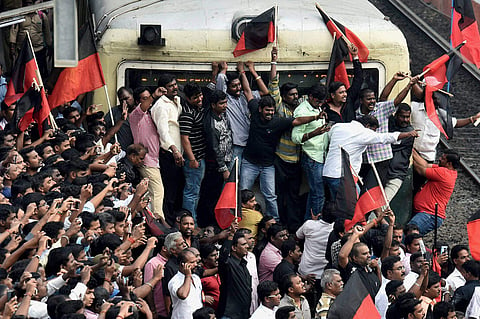

CHENNAI: Tamil Nadu has the second highest Christian population in the country but they feel left out as there isn’t even one significant party to represent the interests of the 44-lakh members of the community.
In the last Assembly elections, the Indian Christian Front and the Christian Democratic Front contested four seats and won a combined of 800 votes. In comparison, the Indian Union Muslim League and the Manithaneya Makkal Katchi, the two biggest Muslim parties, secured 5,10,958 votes even though the Muslim population is slightly lesser than the Christians in the State.
The lack of Christian parties in State is attributed to the widespread Christian affinity for the DMK and Congress. However, experts believe that there is more to this than just the age-old love affair with these two parties such as lack of unity, leadership and necessity.
While the Protestant-Catholic divide is one major limitation for a unified Christian front, experts opined that inability of various sub-denominations to rally together, is a far more debilitating factor. “In the Protestant sect, the mainline churches have come together for a common cause but they have been unable to get the pentecostal churches to also participate,” said M Spurgeon, South Asia Director for the United Board for Higher Education in Asia.
Bishop of Dharmapuri, Lawrence Pius Dorairaj, observed that this lack of unity among denominations also continued among Christian parties that were launched during his time as Bishop of Mylapore-Madras. “There was no unity among these parties. They always chose to ally with bigger parties,” Bishop Pius said, also pointing out a lack of charismatic leadership to bridge these differences.
Spurgeon attributed a lack of leadership to the fact that the Christian mission in India was limited to education and healthcare. “Christians didn’t believe that they could witness the same through politics. I think that this belief is yet to come though in the bible, prophets actively helped kings with politics,” he said, explaining the general aversion towards risk taking also contributed to the lack of strong political leaders in the Christian community.
The strong penetration of the Christian mission from the eighteenth century in the form of educational institutions and hospitals, has also had a chilling effect on political activity in the community. Christians have been able to approach the church for basic necessities without depending on the government or political parties. Joshua Kalapati, head of the department of Philosophy in Madras Christian College, believes that this could be one of the reasons behind political apathy among Christians.
Bishop Pius observed examples of this privilege that Christians enjoy in Dharmapuri. “When the Collector announces scholarships, it is the Muslim youth that generally run after them because of lack of other avenues,” he said.
However, Professor Kalapati believes that this lack of interest in politics could be detrimental for the Christian community. “Christians have to take Ambedkar’s advice seriously and represent their interests politically,” he said, claiming that Christians are yet to answer the most important part of his clarion call — Organise.